If you are passionate about the planet, then you may have an online environmental science degree in mind.
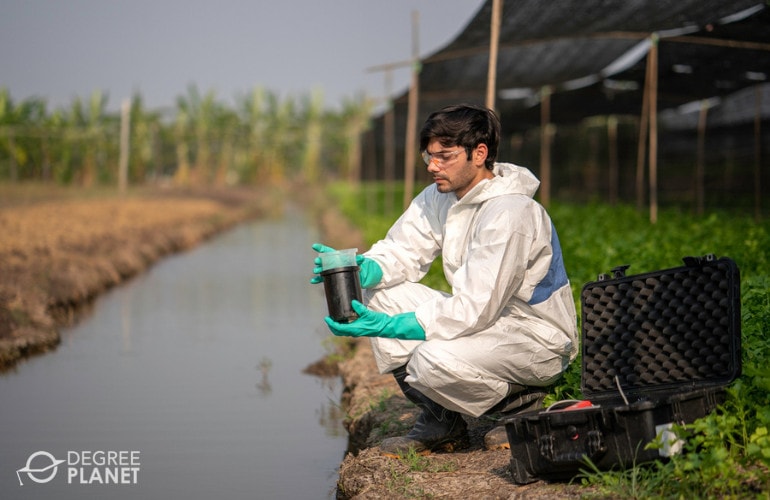
In this field of study, you’ll explore multiple scientific disciplines and learn about their applications for restoring habitats, protecting environments, and promoting sustainability.
Editorial Listing ShortCode:
An online environmental science degree could be the right fit for students with a knack for science and a desire to help the Earth. If that describes you, then you may want to take a look at how green degrees could lead to a meaningful career in the environmental field.
Environmental Science Degrees Online

A degree in environmental sciences can train you to use scientific knowledge for the care and improvement of the natural world. This discipline incorporates information from many different branches of science, including chemistry and biology.
The coursework may address topics like:
- Chemistry
- Climate
- Environmental ethics
- Evolutionary biology
- Geographical information systems (GIS)
- Geology
- Life sciences
- Microbiology
- Natural resource management
- Soil and water
- Toxicology and hazard control
Because of the scientific focus of this major, lab work is common for an environmental science curriculum. Even if you choose to pursue an online environmental degree, you’ll probably have several lab courses. You may work in a virtual laboratory or use at-home kits for hands-on labs.
Editorial Listing ShortCode:
In addition, environmental science students often engage in fieldwork. Some colleges even provide the opportunity to study abroad. Others may offer intensive travel courses that last one or two weeks. Environmental science programs often give you the opportunity to choose a specialization or a minor. Your options might include microbiology, resource conservation, wildlife management, or ecological restoration.
Professionals with this undergraduate degree may work in jobs related to research, policymaking, or education. Some work as assistants or technicians who work alongside more advanced scientists. Professionals with more experience or training could conduct research projects or head up data analysis efforts. They might focus on initiatives related to forestry, ecological restoration, wildlife management, or sustainability.
Common Bachelor Degree in Environmental Science Concentrations
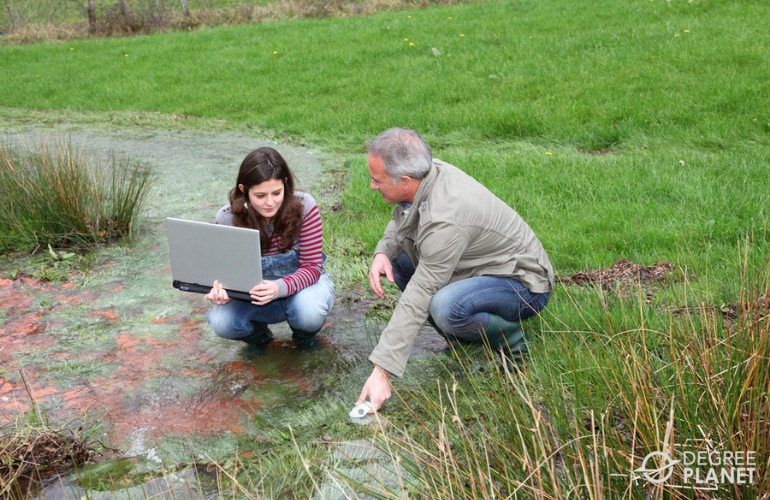
Environmental science is a broad scientific discipline. While it can provide a firm foundation for a variety of career directions, it may be necessary to get extra training in one particular aspect of the field. A specialization can prepare you well for various jobs and improve the strength of your resume.
Concentrations and minors are common ways that schools provide this sort of in-depth study. While the selection can change from one college to the next, here are some common specialization tracks:
- Conservation. In this concentration, you would specialize in protecting natural resources and exploring the connections between humans and their environments.
- Earth Science. You could round out your studies with a variety of courses focused on various Earth science branches, including hydrology, mineralogy, petrology, and geochemistry.
- Fish and Wildlife. Fish and wildlife studies typically cover characteristics of land and water species and address conservation practices that protect animal habitats.
- Soil and Water Management. Through classes related to environmental chemistry, microbiology, and agricultural ecology, you can learn how to restore various ecosystems and improve the quality of land and water resources.
- Restoration Ecology. This track focuses on bringing natural areas back to their previous states by removing invasive species and supporting native ones.
If you attend a college that doesn’t provide specific concentration tracks, you might have space in your schedule for multiple electives. By selecting electives that center on a particular topic, you can tailor your studies toward the subdiscipline of your choosing.
Environmental & Sustainability Science Careers and Salaries
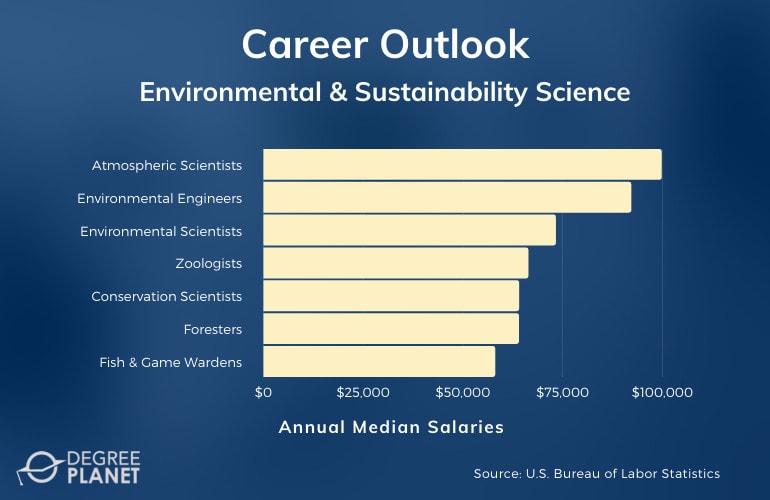
An online environmental degree often leads to a scientific career related to protecting life or promoting sustainability. Those jobs may involve working indoors in an office or a lab. Other scientists spend the majority of their time working outdoors.
Working as a technologist or a technician could be an entry-level way to get started in these scientific fields. A major in this field could also become a law enforcement officer who guards natural resources. Their job title might be fish and game warden or conservation officer.
According to the Bureau of Labor Statistics, jobs in the life, physical, and social sciences pay a median annual salary of $69,760.
| Careers | Annual Median Salaries |
| Atmospheric Scientists | $99,740 |
| Environmental Engineers | $92,120 |
| Environmental Scientists and Specialists | $73,230 |
| Zoologists and Wildlife Biologists | $66,350 |
| Conservation Scientists | $64,020 |
| Foresters | $63,980 |
| Fish and Game Wardens | $58,040 |
| Environmental Engineering Technologists and Technicians | $51,630 |
| Environmental Science and Protection Technicians | $46,850 |
| Biological Technicians | $46,340 |
Environmental scientists and specialists gather data about natural conditions. Their analyses may contribute to policy or planning decisions. Their work may help environmental restoration planners with future sustainability efforts. Environmental engineers can apply engineering ideas to solve soil or water issues.
Editorial Listing ShortCode:
Conservation scientists consider the environmental impacts of logging and other activities related to forest lands. Foresters work closely with conservation scientists to grow, protect, or harvest trees. Other related scientific roles include zoology, wildlife biology, management of environmental resources, and atmospheric science. A college minor or a masters degree could help you obtain some of the more specialized jobs in this field.
Environmental Science Bachelors Curriculum & Courses

You will likely take a wide range of science courses in an environmental science curriculum. You may also study topics related to leadership, public policy, education, and statistics.
- Chemistry for Environmental Science: This class covers the environmental chemistry involved in life processes and in climate, soil, and water quality.
- Climate Change: During your time in this class, you’ll study the facts about climate change, survey the implications of a changing planet, and consider ways to address this issue.
- Energy Sources: You’ll discuss renewable and nonrenewable forms of energy and consider the environmental impact of each one.
- Environmental Public Policy: The topics in a public policy class may address how environmental laws are made, funds are distributed, and public opinion is swayed through advocacy efforts.
- Geographic Information Systems (GIS): Environmental science professionals, especially those who spend a lot of time doing fieldwork, need to know how to use GIS technology to locate places and record information.
- Introduction to Geology: You’ll learn about geographical formations, processes inside the earth, and methods of geological experimentation.
- Microbiology: The focus of this course will be on biological processes that involve tiny organisms, such as bacteria and fungi.
- Soil Science: The study of soil will cover its physical makeup as well as the biological and chemical processes that occur within it.
- Statistics in the Biological Sciences: You’ll study experimental methods for gathering data and acquire skills for quantitative data analysis.
- Waste Management: This class may cover how to produce less waste as well as how to reduce the environmental impact of the waste that already exists.
Students may also engage in fieldwork, complete internships in environmental management, or write a research thesis.
Why Get an Online Degree in Environmental Science?
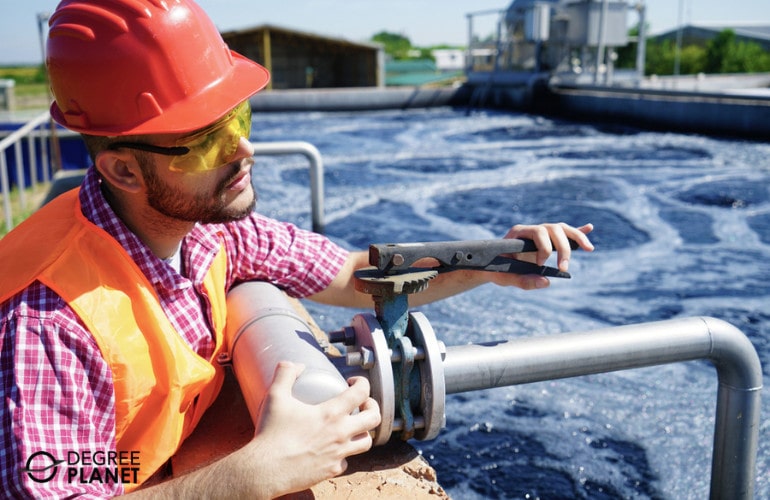
Before you commit to an online environmental science program, it can help to think about why you want to pursue an online bachelor’s degree in this major. Here are some reasons that might resonate with you:
- Job opportunities. Environmental science majors work in various settings, including outdoors, in laboratories, and in offices. Environmental science graduates may be involved with research, advocacy, policy decisions, or natural resource management.
- Environmental impact. Students often choose this major because they desire to commit their lives toward caring for natural resources and protecting the planet through environmental management.
- Earning potential. While scientific technologists and technicians don’t always need a bachelor’s degree, going to college may increase your chances of securing a scientist role. Those jobs usually command higher salaries than assistant positions.
- Graduate studies. If you want to get a master’s or doctoral degree, you’ll generally need a bachelor’s degree first.
With this degree, you may be poised to make a tangible difference in the world around you.
How to Know If an Environmental Sciences Degree Online Is Right for You
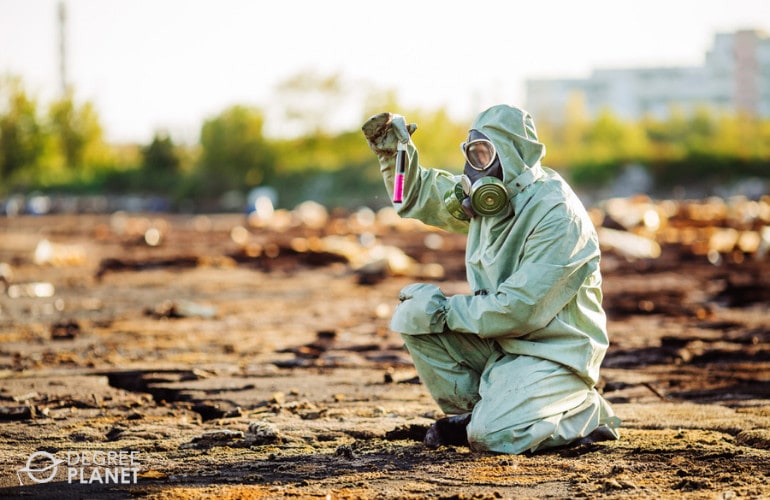
As you consider an environmental sciences degree program, you probably have questions about whether this is a suitable field for you. You can compare your strengths to the characteristics in the list below:
- Environmental commitment. Not surprisingly, environmental science focuses on caring for and protecting the planet. A passion for wildlife or natural resources could drive you toward this undergraduate degree.
- Job security. Most college students would say that they’re looking for an in-demand set of skills, and environmental science studies can provide that. According to the Bureau of Labor Statistics, jobs for environmental specialists are growing as fast as the national average.
- Science-focused. Students study many different branches of science—including chemistry, geology, and biology—so it can be beneficial for you to enjoy or have an aptitude for science.
- Variety. Because environmental science addresses so many different branches of science, you’ll get an introductory overview of many subject areas instead of an in-depth exploration of one or two. If you’re someone who enjoys variety, this aspect might appeal to you.
If you’re looking for an option that touches on many areas of the science behind environmental resources and could make a difference in the world around you, then environmental science may be a good fit for you.
Bachelor of Science in Environmental Science Admissions Requirements

Each college sets its own requirements for admission to the environmental science major. Common application requirements are listed below.
- Completed application form and fee
- High school transcripts and any university transcripts
- Personal statement
- ACT or SAT scores (not required by all schools)
Colleges with rolling admissions may accept application packets throughout the year, but others have firm deadlines for when they must receive materials. Rolling-admissions schools often respond with an admissions decision within one to two weeks.
Accreditation

You probably want to know that you’re going to a quality college. One of the best ways to accomplish that is to go to an accredited school. Regional accreditation applies to the whole institution and is highly respected throughout the country.
Editorial Listing ShortCode:
If a college has regional accreditation, then every single one of its departments will be included in that status. Colleges respect one another’s regional accreditation, so going to an accredited school may help you transfer credits or get into grad school later on. Holding an accredited degree could also be an asset during a job search.
Environmental Science Licensure and Certifications

Industry certification programs demonstrate your competence and expertise as an environmental specialist. Qualifications for becoming a Registered Environmental Manager (REM) typically include a bachelors in an environmentally related field and at least 5 years of professional experience. Many state and federal agencies acknowledge this certificate.
Other certificates—such as Certified Safety Professional (CSP) and Certified Hazardous Materials Manager (CHMM)—can bolster your credentials in a specific area of the field. Becoming a Registered Environmental Professional (REP) is the ultimate certification goal for many people in this field. To achieve this certificate, it’s necessary to gather many years of experience and earn a graduate degree in the field.
Financial Aid and Scholarships

If you qualify for financial aid, the government, your college, and other organizations may help you pay for school.
Government aid usually comes in the form of grants and loans. In addition to federal financial aid, many states distribute financial assistance as well. Filling out the Free Application for Federal Student Aid (FAFSA) can help you get started with government assistance.
Many colleges have scholarship funds to distribute. Some awards may be available for students in any department, and others may be reserved for environmental science students. Private organizations like community clubs and industry associations give out scholarships, too. Even employers sometimes give tuition help to qualifying employees.
Environmental Science Professional Organizations

Caring for the environment is a group effort, so it’s important to collaborate with others in this field. Joining a professional organization can help you do that.
- American Academy of Environmental Engineers and Scientists (AAEES)
- National Association of Environmental Professionals (NAEP)
- Society for Conservation Biology (SCB)
Membership benefits are often extensive. You may receive access to publications, online toolkits, forums, and member lists. In addition to providing online networking resources, groups often have local chapters and annual conferences for in-person opportunities.
Is Environmental Science a Good Major?
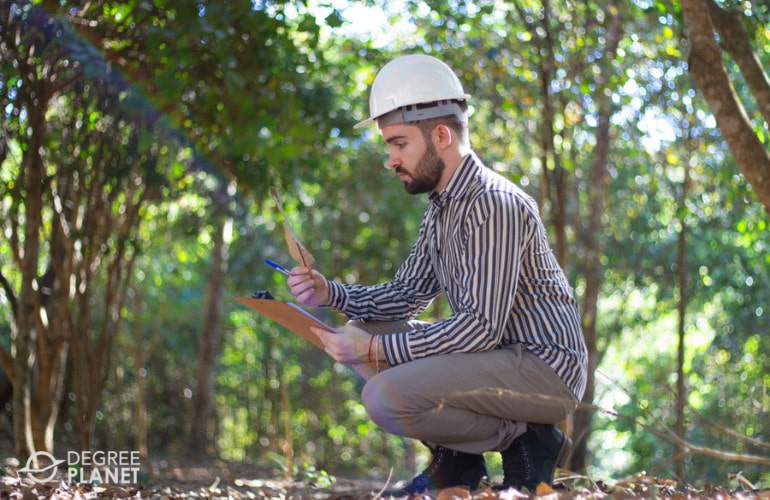
Yes, environmental science is a good major for many undergraduate students. Careers in this field include environmental specialist, game warden, atmospheric scientist, or biological technician.
According to the Bureau of Labor Statistics, most environmental scientists and specialists earn between $42,960 and $129,450 annually. Federal government agencies pay the most. The median salary for environmental specialists in federal jobs is $103,180. Environmental science can also prepare you for graduate work in fields like biology or civil engineering.
What Jobs Can You Get with an Environmental Science Degree?
Some graduates go on to become environmental specialists. According to the Bureau of Labor Statistics, they typically work for consulting firms or government agencies. They often partner with environmental protection technicians.
Editorial Listing ShortCode:
Other professionals in the field choose careers in environmental engineering. They often work for engineering organizations or federal, state, or local government agencies. Students in this field may also pursue law enforcement careers as fish and game wardens. These types of wardens usually work for state or local governments.
What Does an Environmental Scientist Do?
Environmental scientists are often involved in research projects. For example, they may investigate ways to protect ecosystems or restore natural areas. Business or government leaders can use their findings to formulate plans for addressing environmental issues.
These professionals often work in labs. Some do fieldwork to gather data, but that responsibility often falls on environmental science technicians. Scientists may take the samples or readings that the technicians collect and perform analyses on them. The different types of workers in the field include restoration planners and industrial ecologists.
What Can You Do with an Environmental Science Degree?
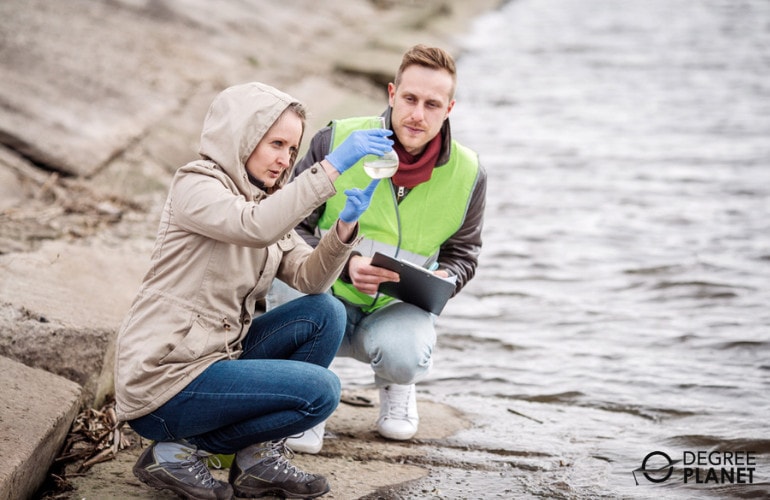
Environmentalist degrees can help students start science careers. Some enter the field as technicians, such as environmental protection or biological technicians. They may prepare lab materials or gather field samples for scientists.
According to the Bureau of Labor Statistics, bachelor’s degrees can also help graduates qualify for positions as scientists. Potential specialties for environmental professionals include atmospheric science, conservation science, zoology, and wildlife biology. Some environmental science graduates pursue careers as conservation police, protecting natural areas.
Is Environmental Science Hard?
Students in environmental science programs take many science courses. Coursework often includes biology, chemistry, and physics. There may be more specialized science classes, such as geology and molecular biology, as well.
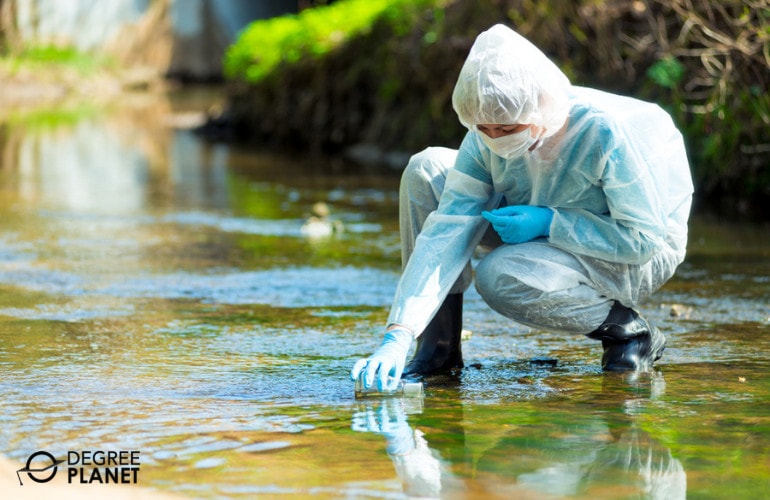
In addition, science classes typically require extensive lab work. Environmental science programs include advanced math classes, too. Classes on calculus and biostatistics may be included in the curriculum. Fieldwork is also common. During your program, you might be encouraged to study abroad, enroll in a week-long travel course, or complete an internship.
How Long Does It Take to Get a Bachelor in Environmental Science Degree Online?
It generally takes 4 years to earn a bachelor’s degree in environmental science. That’s with full-time study at a school that uses a traditional semester calendar.
Some online bachelor’s degree programs can help you complete your degree more quickly, offering accelerated academic calendars with year-round courses. Also, many online colleges have generous transfer policies. If you have multiple accredited courses that you can transfer in, you may be able to complete your environmental science core courses in less time.
What’s the Difference Between a Bachelor’s Degree in Environmental Studies vs. Environmental Science?
Although these two fields may sound like the same degree, there are usually some differences between the two programs.
| Environmental Science | Environmental Studies |
|
|
Some environmental studies programs include science-focused concentrations.
What’s the Difference Between a BS in Environmental Science vs. Ecology?
Preparing for a career as an environmentalist could involve majoring in environmental science or ecology. The following chart may help you decide between the two paths.
| Environmental Science | Ecology |
|
|
Because ecology is a subset of environmental studies, colleges for environmental science often include ecology courses as part of their curricula.
What’s the Difference Between Environmental Engineering vs. Environmental Science Bachelor Degree?
Both environmental engineers and environmental scientists strive to care for natural spaces and the planet’s resources. Let’s take a look at how these jobs compare.
| Environmental Scientists | Environmental Engineers |
|
|
On average, environmental engineers tend to earn more than environmental scientists.
Is a Bachelors in Environmental Science Worth It?

Yes, a bachelors in environmental science is worth it for many professionals. Environmental science is a field that’s committed to caring for the planet, its many plant and animal species, and people, too. If those goals are important to you, then you might be right at home in this program.
Editorial Listing ShortCode:
There is also the potential for job growth in this field. According to the Bureau of Labor Statistics, jobs for environmental specialists are growing at an 8% rate over the next decade, which is right on par with the national average for all job categories.
Universities Offering Online Bachelors in Environmental Science Degree Programs
Methodology: The following school list is in alphabetical order. To be included, a college or university must be regionally accredited and offer degree programs online or in a hybrid format.

American Public University offers an online Bachelor of Science in Environmental Science program. Courses start monthly and are 8 or 16 weeks long.
Students in the environmental science degree program have multiple concentrations to choose from. Options include General, Sustainability, Environmental Technology and Management, Fish and Wildlife Management, and Regional and Community Environmental Planning.
APUS is accredited by the Higher Learning Commission.

Oregon State University offers a B.S. in Environmental Sciences program that is entirely online. There are four start dates per year.
Students in the environmental science degree program may choose to specialize in Applied Ecology, Aquatic Biology, Conservation, Resources and Sustainability, Earth Systems, or Environmental Agriculture. They may also choose Environmental Policy and Economics or Environmental Water Resources.
Oregon State University is accredited by the Northwest Commission on Colleges and Universities.

Prescott College offers both a BA and a BS in Environmental Studies. Both degrees can be earned online or on campus. Courses in the program include Natural History and Ecology of the Southwest, Marine Studies, Conservation Biology, Energy and the Environment, and Form and Pattern in Nature.
Prescott College is accredited by the Higher Learning Commission.

Southern New Hampshire University offers an environmental science degree online. Students can receive custom lab kits in the mail, which allows the lab courses to be completed remotely. The program offers concentrations in Data Analytics in Science and Natural Resources and Conservation.
Southern New Hampshire University is accredited by the New England Commission of Higher Education.

The University of Arizona offers a Bachelor of Science in Environmental Science with emphases in Soil, Air, and Water and Leadership, Sustainability, and Communication. Some of the environmental science courses included are Fundamentals of Environmental Science and Sustainability, Critical Zone Science, Analysis and Life in the Environmental Sciences, and Pollution Science.
The University of Arizona is accredited by the Higher Learning Commission.
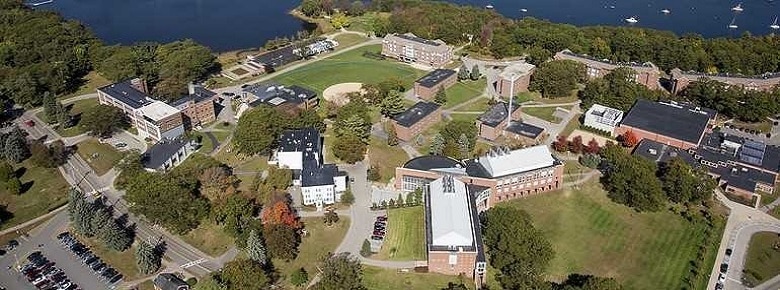
The University of New England offers a Bachelor of Science in Environmental Science that can be earned online or on campus. UNE uses a trimester calendar, and full-time students can potentially complete their degrees in as little as three years. Students in the program also have the opportunity to undertake a research unit.
The University of New England is accredited by the New England Commission of Higher Education.

The University of Phoenix offers an online program for a Bachelor of Science in Environmental Science. Classes in the program are 5 to 7 weeks long, and students typically take one course at a time. There are up to ten start dates available per year. Students in the environmental science degree program program study renewable resources, ethical responsibilities, climate change, urban infrastructure, and public policy, among other topics.
The University of Phoenix is accredited by the Higher Learning Commission.

Virginia Wesleyan University offers a Bachelor of Arts in Environmental Studies. The program is intended to prepare students for employment in corporate sustainability, environmental science, conservation, and related fields. Courses include Macroeconomics, Microeconomics, Environmental Policy Analysis, Environmental Writings, and Introduction to Geographic Information Systems.
Virginia Wesleyan University is accredited by the Southern Association of Colleges and Schools Commission on Colleges.

Washington State University offers an online program for a Bachelor of Science in Earth and Environmental Sciences. It includes studies in geology, oceanography, ecology, geographic information systems, climate change, natural resources, and environmental policy. Students in the program also have the option to earn an Organic Agriculture Undergraduate Certificate while completing their degree.
Washington State University is accredited by the Northwest Commission on Colleges and Universities.
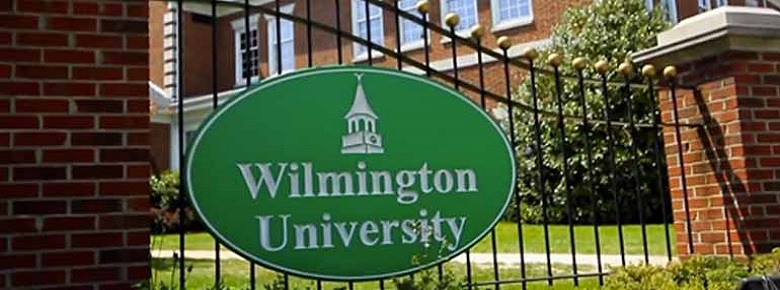
Wilmington University’s Bachelor of Science in Environmental Science and Policy program is designed to provide a highly flexible online experience. Wilmington provides custom lab kits to online students in the program so that hands-on learning does not have to be sacrificed. Class sizes are small to help students get valuable interaction with each other and their instructors.
Wilmington University is accredited by the Middle States Commission on Higher Education.
Getting Your Bachelor of Environmental Science Online

Studying environmental science could help prepare you to make the world a safer and healthier place for people, plants, and animals. You can learn to protect ecosystems, promote sustainability, and conduct research.
As a professional in environmental science, you may someday take a job that involves lab exploration, policy design, data collection, or habitat care. An online environmental science degree can provide the necessary foundation for a career in this field. With computer-based study, you can acquire new information, complete assignments, and even engage in lab work.
You can start searching today for the accredited college that can help you achieve your environmental science goals.

